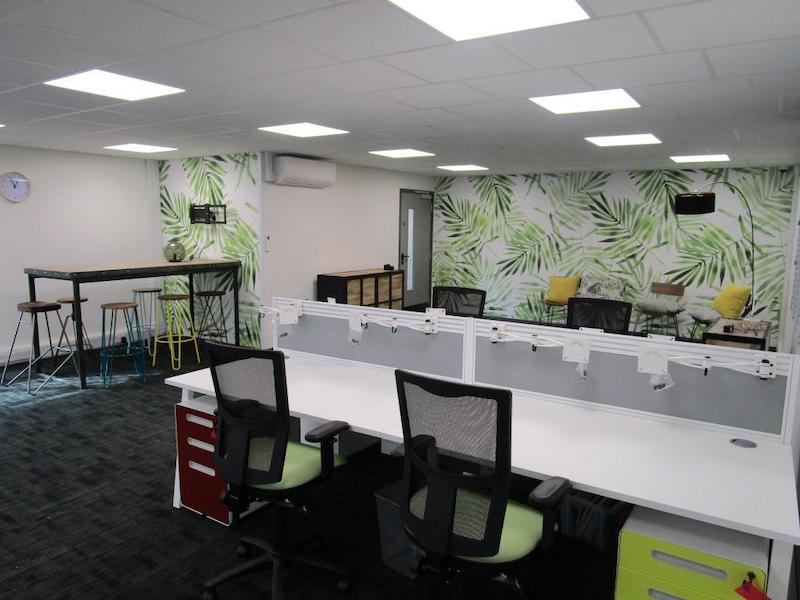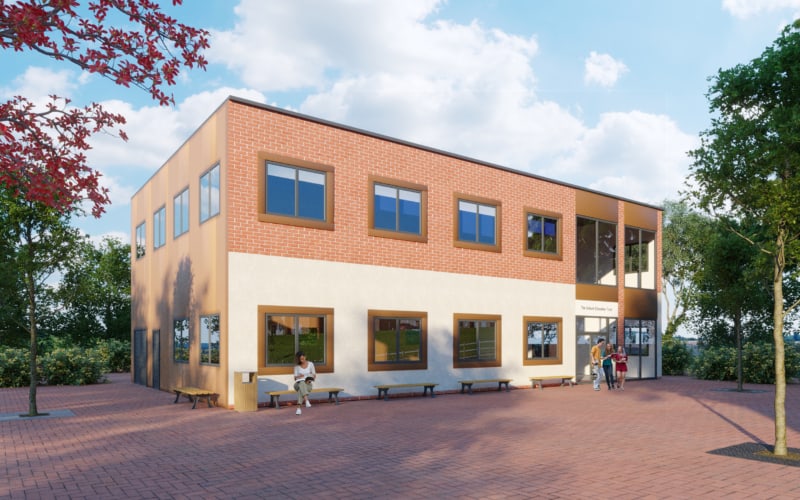01.07.2022• Modular Buildings
Portable Buildings As Offices

Over the last fifty years, portable buildings of all kinds have become increasingly popular as accommodation. As a result, many companies know the significant advantages portable office buildings have for a business.
Portable offices are modular construction. They can be temporary or permanent and are customisable to exact requirements. You can buy a second-hand portable building, hire a modular building, and flat-pack, self-assembly versions. With modular construction, also known as volumetric construction, about 90% of the construction is off-site in a factory environment. Then the parts are delivered to the desired location by road before being manoeuvred by crane.
Very little preparation of the site is needed; apart from some ground levelling, there’s no requirement to dig foundations. Then, after connection to mains electricity and plumbing, the office is ready to go. See our timelapse video of a past project.
Benefits of Modular Offices
When it comes to new office buildings, nothing beats going modular. However, if you’re not keen on a brand new office building, you can choose a refurbished one. Refurbished modular buildings have a lot of benefits, especially as an alternative to constructing a traditional office.
Fast Construction Times – Neither your accountant nor you want to shoulder the costs associated with too much downtime. Refurbished buildings take up to 70% less time to construct than traditional buildings, as most of the work is already complete upon delivery. Once ready, all that remains is transporting your refurbished office to the site and setting up the basic infrastructure. Planning the extension of your business premises can be stressful. Out-of-hours construction is expensive, but so is the loss of productivity that you encounter when construction occurs during office hours. Modular buildings are the ideal solution, as the buildings are prefabricated, with up to 90% of the construction completed off-site in a factory. With as little as 10% of the construction occurring on-site, noise and disruption are minimal. Unlike traditional construction methods, modular techniques enable simultaneous construction. For example, the ceilings are built simultaneously with the walls. When using traditional, on-site construction, this would not be possible. The construction of individual components can also coincide with the initial site work. These benefits significantly cut construction times, ensuring that your building is complete as soon as possible. As most construction work takes place indoors, volumetric construction can eliminate many potential delays. For example, the project’s schedule is unlikely to be affected by the weather.
Sustainability – Being green is a fundamental component of modern British business. Refurbished modular offices are as green as possible. Your Local Council and Planning Authority are less likely to tie you up in red tape. Typically, portable office buildings have a lower carbon footprint than traditionally constructed buildings. Many recycled materials get used in construction, and the offices can be dismantled at the end of a project, recycled, and used elsewhere. Modular buildings are an excellent choice if you are concerned about your business’s environmental impact. According to independent research, it is possible to reduce wasted materials by up to 90% by choosing modular construction over traditional methods. In addition to the reduced wastage, the materials used in modular construction can often be recycled. If you no longer require the building, your business could reuse the components. Construction projects utilising modular techniques will likely have a lower carbon footprint than traditional alternatives. Fewer vehicles are required to transport materials to and from the construction site, resulting in lower emissions. Most of the building is delivered at the end of the project when it is ready to be installed.
Cost-Effective – Modular offices are cheaper to construct than normal ones, and refurbished modular offices are still more affordable. In an era of tight budgets, the cost of a refurbished modular office will impress the most austere of bean counters. Portable office buildings cost much less than traditionally constructed buildings. They can be available in a fraction of the time, minimising delay and disruption to the day-to-day running of the business. Leasing is also available, so the financial outlay is minimised.
Less Health and Safety Management – There’s a good reason hospitals and other sites with high foot traffic choose modular offices. With most of the construction taken care of off-site, the chance of injury becomes significantly reduced.
Design Flexibility – One of the annoyances of moving into a traditional office is your ability to alter the layout to suit your needs. Even refurbished modular buildings allow you to tailor the design to suit your needs. Prefabricated buildings are available in many different sizes and can be linked side-to-side, end-to-end, or even stacked vertically with internal staircases. Additional facilities, such as toilets, can be added to provide flexible accommodation to suit different requirements. They can also be made more permanent by the addition of exterior cladding. Modular buildings blend in with other facilities already on-site if required. The needs of your business are constantly evolving, making it difficult to commit to a particular building solution. Traditional construction methods are rigid, affording little flexibility. Should your requirements change in the future, additional building work can be costly and time-consuming. With modular construction, your building can evolve along with your needs. The modules can often be deconstructed and reassembled in different configurations, reducing the time and cost associated with making changes to your building.
Strict Quality Control – Refurbished modular buildings are built and refurbished in factory-controlled environments. Unlike traditional facilities, your modular offices will meet stringent safety and compliance standards. Modular buildings have to meet the same building codes as conventional construction, so the quality and durability of the finished product are guaranteed. There’s also never any compromise made on safety standards.
Quality Materials – New materials are constantly being tested in the traditional building sector. Sometimes these are successful, but huge post-construction problems can occur when they go wrong. Modular offices are durable, built from substantial building materials that are transported by truck and lifted by a crane. Any building that can handle this can handle anything.
Two of the biggest mistakes people make when contemplating modular office space solutions is thinking modular offices are temporary and non-versatile. The reality is modular offices are built to last and designed for any number of applications.
- Corporate Offices – Modular offices can accommodate new staff, and the buildings take little time to construct.
- Showrooms – Modular offices make for a well-constructed, minimal environment where you can quickly get your products and salespeople in front of your market.
- Call Centres – Large-scale modular offices are perfect for creating a safe, cost-effective call centre environment that can be expanded upon or redesigned when needed. From large single rooms to multi-storied complexes, modular buildings can do anything a traditional building can, but better.
- Medical Facilities – From consultation rooms for GPs to laboratories and operating theatres, there’s nothing that can’t be achieved with a modular building.
- Storage Facilities – Building modular offices are the perfect solution if you require secure, substantial storage facilities that don’t cost the earth to erect.
The above is a fraction of what modular offices can adapt to. So before you look at adding any new building to your organisation, contact a modular office supplier and discuss your options in-depth.
Related Posts

31.10.2024• Modular Buildings
How Modular School Buildings Support Modern Teaching Methods
As teaching methods evolve to meet the needs of today’s students, schools require flexible, adaptive spaces to support innovative learning experiences. However, traditional classrooms...
Continue Reading
31.10.2024• Modular Buildings
Why Modular Buildings are the Future for Growing Businesses
From startups to large, established companies, flexibility and efficiency are integral to business growth, especially when it comes to physical space. Though effective, traditional...
Continue Reading
19.09.2024• Modular Buildings
Why Businesses Are Choosing Modular Solutions for Sales & Marketing Suites
First impressions count, and businesses need to make the most of those experiences. Sales and marketing suites offer companies a unique opportunity to showcase...
Continue Reading